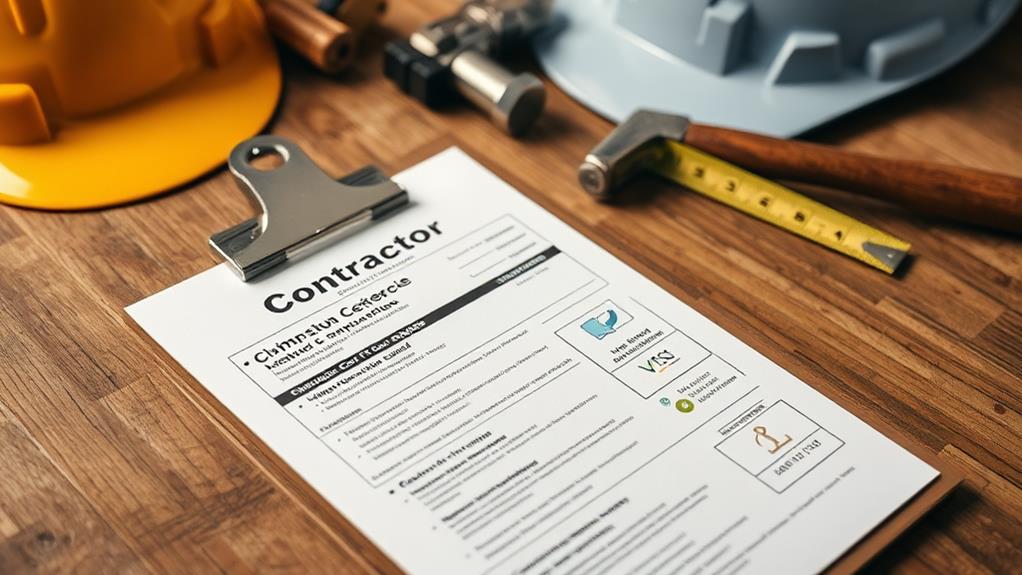When you're choosing a reliable contractor, start by gathering recommendations from friends, family, or local community groups. Next, verify the contractor's credentials by checking licenses, insurance, and references. Conduct interviews to assess their experience and communication style. It's vital to outline a clear project plan, specifying tasks and timelines. Manage payments carefully by linking them to project milestones, and avoid large upfront fees. Finally, maintain ongoing communication throughout the project to address any issues quickly. By following these steps, you'll set yourself up for success and learn even more essential tips along the way.
Gathering Recommendations and Insights

When you're looking to hire a reliable contractor, gathering recommendations and insights from your network is essential. Start by asking friends, family, and neighbors who've recently completed similar projects. They can give you realistic assessments of various contractors' performance.
Utilize community apps and local social media groups to gather additional insights and referrals. This way, you can connect with others in your area who may have firsthand experience. Additionally, consider checking reliable local contractors to find vetted professionals who've been recommended by others.
Don't overlook professional associations like the National Association of the Remodeling Industry (NARI) or the National Association of Home Builders (NAHB). They provide lists of qualified contractors, ensuring you're looking at reputable options.
Additionally, speak with building inspectors or employees at local lumberyards; they often know which contractors are trusted in your community.
Lastly, take the time to read online reviews and testimonials on platforms like Google and Yelp. These reviews can help you evaluate contractors' credibility and past client satisfaction.
Conducting Effective Interviews
After gathering recommendations and insights, the next step in finding a reliable contractor involves conducting effective interviews.
Start by holding phone interviews to check if the contractor has experience handling projects similar in size and complexity to yours. This helps you gauge their capability.
Inquire about their financial references from suppliers or banks. This is vital for evaluating their reliability and financial stability.
Request a list of previous clients, too, as it allows you to verify the contractor's credibility and gather feedback on their performance.
It's also important to understand how many concurrent projects the contractor manages. This gives you an idea of their capacity to dedicate time and resources to your project.
Verifying Credentials and Experience

When you're choosing a contractor, it's essential to verify their credentials and experience.
Start by checking that they've the necessary licenses and insurance, which you can confirm with local agencies and insurance providers.
Additionally, ask about their experience with similar projects and look for references to guarantee you're making a reliable choice.
License and Insurance Verification
Verifying a contractor's license and insurance is essential for ensuring you're working with a qualified professional. This step protects you from potential issues down the line.
Here are some key actions to take during the license and insurance verification process:
- Check with local authorities to confirm the contractor's licensing status, ensuring they comply with state regulations.
- Request proof of insurance, including liability and workers' compensation, then verify coverage directly with the insurance company for added security.
- Investigate any disciplinary actions or complaints against the contractor through state licensing boards or consumer protection agencies to gauge their reliability.
Experience With Similar Projects
To guarantee you hire the right contractor for your project, it's vital to dig into their experience with similar jobs. Start by asking for a portfolio showcasing their completed projects. This will help you assess their suitability for your specific needs.
Additionally, request references from previous clients who'd similar projects. This can help you gauge satisfaction with the contractor's work and reliability.
Consider the duration of the contractor's experience in the industry. Those with a longer track record often possess more expertise and can handle challenges more effectively.
It's also important to check for any relevant certifications or specializations that indicate the contractor's proficiency in the specific type of work you require, such as electrical or plumbing.
References and Background Checks
After evaluating a contractor's experience with similar projects, it's time to verify they meet all necessary qualifications. You can do this by checking their references and conducting thorough background checks.
Start by verifying their credentials with local authorities to ascertain compliance with state regulations. Then, request proof of insurance coverage, including liability and workers' compensation. Confirm this coverage directly with the insurance company to protect yourself from potential liabilities.
Here are some key steps to follow:
- Ask for a list of recent references, focusing on projects similar to yours to gauge customer satisfaction.
- Review online reviews and testimonials to assess the contractor's reputation.
- Look for any disciplinary actions or complaints filed against them to understand their credibility.
Developing a Clear Project Plan
To develop a clear project plan, you need to define the project scope clearly, which includes outlining specific tasks and materials.
It's also important to establish realistic timelines to keep everything on track and guarantee everyone knows what to expect.
Define Project Scope Clearly
Defining the project scope clearly is essential for successful collaboration between you and your contractor. When you outline what you expect, it helps both parties understand the specific tasks, materials, and timelines involved, which minimizes misunderstandings.
To create a solid foundation for your project, consider including:
- A detailed project plan that outlines deliverables, design specifications, and project phases.
- A budget range that allows contractors to tailor their proposals and avoid cost overruns.
- A written contract that documents all aspects of the project scope, serving as a reference point for both parties.
Establish Realistic Timelines
Once you've clarified the project scope, the next step is establishing realistic timelines. A clear project plan outlines the specific scope of work, materials needed, and a realistic timeline. This helps set expectations for both you and the contractor.
When planning, make sure to include buffer time for potential delays, like weather conditions or material shortages, so your project stays on track.
Take a look at your payment schedule as well. It should align with the milestones defined in your plan, allowing you to monitor progress and maintain accountability.
As work begins, be open with your contractor about any changes or unexpected challenges. This keeps the project moving smoothly and minimizes disruptions.
Regularly review your project timeline against actual progress. If needed, adjust the plan to foster transparency and collaboration between you and the contractor.
Managing Payments and Contracts

When managing payments and contracts with your contractor, a clear structure is essential for safeguarding your investment. To minimize financial risk, establish a payment schedule linked to project milestones. A typical structure includes:
- 10% at signing the contract
- 25% during project intervals
- 15% upon final completion
Avoid making large upfront payments. Retaining a substantial final payment guarantees contractor accountability and motivates them to finish the job well.
Always document all agreements in a detailed written contract that specifies the scope of work, payment terms, and timelines. This helps prevent misunderstandings.
Additionally, include a requirement for lien releases in the contract. This protects you from claims if the contractor fails to pay suppliers, assuring you're not held responsible for unpaid debts.
Make payments to the company rather than individuals, and steer clear of cash transactions. Retaining cashed checks as receipts provides clear financial records.
Ensuring Ongoing Communication
Effective communication is essential for the success of any project, guaranteeing that both you and your contractor stay on the same page. To foster this, you should provide detailed project information and schedule regular check-ins—ideally daily or weekly.
During these meetings, assess the project status, ask questions, and address any issues that arise promptly. Using recap emails to summarize discussions can also help everyone remain aligned on goals and expectations.
It's important to document all agreements and communications, as this creates a reliable reference point for both parties and helps prevent misunderstandings. While you should respect the contractor's autonomy, remain accessible for questions and concerns. This balance fosters a collaborative environment without micromanagement.
At the project's outset, establish a clear communication protocol detailing how updates will be shared and how you can raise concerns or adjustments.
You might also want to use a contractor checklist to guarantee all aspects, including insurance and work done, are covered. By prioritizing ongoing communication, you'll empower your contractor for the job, guaranteeing a smoother workflow at the job site and a successful outcome for your project.
Conclusion
To summarize, choosing reliable contractors is like finding a needle in a haystack, but it doesn't have to be overwhelming. By gathering recommendations, conducting interviews, and verifying credentials, you can make informed decisions. A clear project plan and effective communication keep everyone on the same page. Remember to manage payments wisely and maintain ongoing contact throughout the project. With these expert tips, you'll guarantee a successful partnership that leads to great results for your project.


Leave a Reply